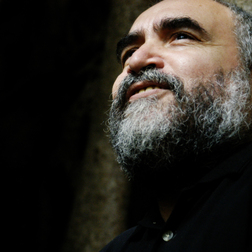Pedro Luis Ferrer, Cuban musician: Difference between revisions
No edit summary |
|||
| (2 intermediate revisions by one other user not shown) | |||
| Line 1: | Line 1: | ||
====Date: [[:Category: | ====Date: [[:Category:1970s - 1980s|1970s - 1980s]]==== | ||
====Region: [[:Category:Central America and the Caribbean|Central America and the Caribbean]]==== | |||
====Subject: [[:Category:Political/Economic/Social Opinion|Political/Economic/Social Opinion]]==== | |||
====Medium: [[:Category:Music|Music]]==== | |||
====Medium: [[:Category:Music|Music | |||
---- | ---- | ||
[[File:Ferrer.jpg|right]] | |||
'''Artist:''' Pedro Luis Ferrer | '''Artist:''' Pedro Luis Ferrer (b. 1952) | ||
'''Confronting Bodies:''' Cuba's "New Love Song Movement," Cuban musicians, the media and the Cuban government | '''Confronting Bodies:''' Cuba's "New Love Song Movement," Cuban musicians, the media and the Cuban government | ||
'''Dates of Action:''' 1970s and 1980s | '''Dates of Action:''' 1970s and 1980s | ||
'''Location:''' Cuba | '''Location:''' Cuba | ||
'''Description of Artwork:''' Ferrer is one of the pioneers of Cuban rock. His songs include guitar, flute, bass and bongo players. Ferrer's songs almost always contain social elements. In his 1994 album, ''100% Cubano'', he makes an allegory of the story of Fidel Castro and sings about homosexuality and prostitution. <P> | |||
'''Description of Artwork:''' Ferrer is one of the pioneers of Cuban rock. His songs include guitar, flute, bass and bongo players. Ferrer's songs almost always contain social elements. In his 1994 album, 100% Cubano, he makes an allegory of the story of Fidel Castro and sings about homosexuality and prostitution. <P> | |||
'''The Incident:''' Ferrer was one of Cuba's most popular musicians until he opposed the "New Love Song Movement," a group of musicians who set rules for songwriting that centered around "protest songs." Ferrer did not want to limit his work by conforming to a governing institution. Consequently, Ferrer was banned by television and radio broadcasters in Cuba. He became ideologically suspect when he criticized the ban on his music and the censorship of other great cuban artists like Celia Cruz. <P> | '''The Incident:''' Ferrer was one of Cuba's most popular musicians until he opposed the "New Love Song Movement," a group of musicians who set rules for songwriting that centered around "protest songs." Ferrer did not want to limit his work by conforming to a governing institution. Consequently, Ferrer was banned by television and radio broadcasters in Cuba. He became ideologically suspect when he criticized the ban on his music and the censorship of other great cuban artists like Celia Cruz. <P> | ||
'''Results of Incident:''' Ferrer continues writing music around the world, however, he remains true to his cuban roots. Although Ferrer's music is prohibited by Cuba's media, his work is still recognized by Cuba's youth. <P> | |||
'''Results of Incident:''' Ferrer | |||
'''Source:''' Censorship, A World Encyclopedia | '''Source:''' Censorship, A World Encyclopedia | ||
[[Category:1970s - 1980s]] | |||
[[Category:1970s]] | |||
[[Category: | [[Category:1980s]] | ||
[[Category: | [[Category:20th century]] | ||
[[Category:Central America and the Caribbean]] | [[Category:Central America and the Caribbean]] | ||
[[Category: | [[Category:Political/Economic/Social Opinion]] | ||
[[Category:Music]] | [[Category:Music]] | ||
[[Category:Pedro Luis Ferrer]] | [[Category:Pedro Luis Ferrer]] | ||
{{DEFAULTSORT:Ferrer, Pedro Luis, Cuban musician}} | |||
__NOTOC__ | __NOTOC__ | ||
Latest revision as of 21:15, 11 November 2016
Date: 1970s - 1980s
Region: Central America and the Caribbean
Subject: Political/Economic/Social Opinion
Medium: Music
Artist: Pedro Luis Ferrer (b. 1952)
Confronting Bodies: Cuba's "New Love Song Movement," Cuban musicians, the media and the Cuban government
Dates of Action: 1970s and 1980s
Location: Cuba
Description of Artwork: Ferrer is one of the pioneers of Cuban rock. His songs include guitar, flute, bass and bongo players. Ferrer's songs almost always contain social elements. In his 1994 album, 100% Cubano, he makes an allegory of the story of Fidel Castro and sings about homosexuality and prostitution.
The Incident: Ferrer was one of Cuba's most popular musicians until he opposed the "New Love Song Movement," a group of musicians who set rules for songwriting that centered around "protest songs." Ferrer did not want to limit his work by conforming to a governing institution. Consequently, Ferrer was banned by television and radio broadcasters in Cuba. He became ideologically suspect when he criticized the ban on his music and the censorship of other great cuban artists like Celia Cruz.
Results of Incident: Ferrer continues writing music around the world, however, he remains true to his cuban roots. Although Ferrer's music is prohibited by Cuba's media, his work is still recognized by Cuba's youth.
Source: Censorship, A World Encyclopedia
